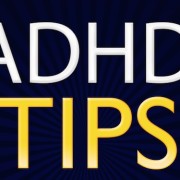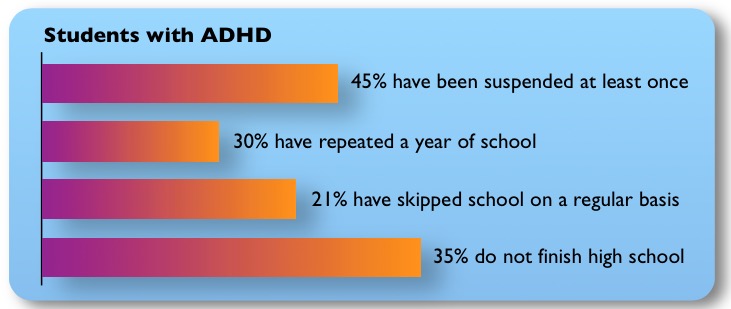Talking to the Teacher
School is overwhelming with distractions for children with ADHD. Your child’s teacher is most likely not specially trained in assisting children with ADHD. Here are some ideas that you, as a parent, can communicate to your child’s teacher in order to help them succeed:
- Ask the teacher for an extra set of textbooks to be kept at home. Despite effort to remember, many distractible students forget to bring home their proper materials.
- Encourage the teacher to seat your child near the front and center of the classroom. This should not be done in an embarrassing or punishing way. Instead, seat him/her in the front using a “random” seat assignment. This way, there are not many students in front of the child to distract him/her.
- Communicate your child’s strengths to the teacher. If your child learns better by creating mnemonics or rhymes or by visual learning, the teacher may be able to tweak the lesson to help.
- Ask for extra feedback on your child’s behavior. Feedback should be given to the student and to the parent via email or take-home messages. Remind the teacher that children with ADHD especially need to celebrate their progress often.
- Tell the teacher that directions should be repeated and written for your child. Oftentimes, when the directions are stated once, they go in one ear and out the other. Repeating gives your child a second chance to catch the directions. Writing directions on the board or assignment gives your child the opportunity to look back at the directions as much as needed.
- Encourage the teacher to ask you for help! Express to the teacher that you realize that he or she is not an expert on ADHD. The teacher may have questions for you or for your child about what he or she can do to help. Also, if a school psychologist or guidance counselor is available, remind the teacher that help can be obtained from these resources as well.
- Ask if your child can share notes with another student. Taking notes quickly is difficult for students with ADHD. By sharing notes, your child can get the information that he/she missed during class.
- Ask for extra time on tests and quizzes. Even if your child does not meet the legal criteria for receiving extra time, the teacher may be willing to provide it regardless.
- Ask the teacher to set up a buddy system in which each student has a few phone numbers of classmates in the case of forgotten homework assignments.
Remember that the more you help the teacher understand your child, the more he/she can help your child!
Contact Dr. Gordon for help with your ADHD. We have treatment and solutions available online, by phone, and in our offices.
written by: Brianna Malinowski, Jay Gordon, Ph.D
Bernstein, J. (2007). 10 days to a less distracted child: The breakthrough program that gets your kids to listen, learn, focus, and behave. New York: Marlowe & Company.
Photo retrieved from: http://www.longislandeyedoctor.com/2014/04/vision-therapy-kids-failing-school/ on Aug. 24, 2015




